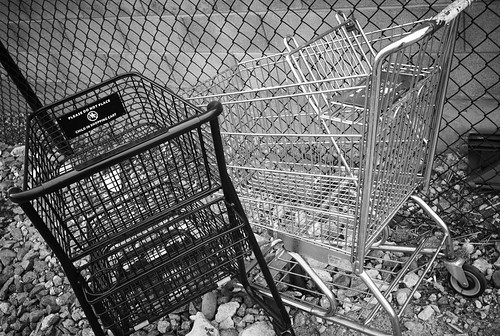Jane Nelsen writes:
Decide what you will do, instead of engaging in power struggles.
1) Plan what you will do and notify in advance.
2) Follow through on your plan with kindness and firmness
It's also a natural part of setting C up for success, as I talk through situations in advance with her and coach her on what choices she can make and how I will respond.
For example, when I take C shopping these days, before we go in I usually talk through my expectations for behavior in the store and how I will respond when those expectations aren't met.
"C, the rules for the store are that you stay close to Mommy, and to look with our eyes but not our hands. If you have trouble using your self-control to stay close to Mommy or look only with your eyes, I will help you by putting you in the cart."

The majority of the time, she does end up in the cart before the end of the shopping trip. Sometimes that is because she got tired and asked to get in. Sometimes it is because I followed through on my stated boundary after she ran away or grabbed something. But as her impulse control gets stronger, she is spending more and more time out of the cart during shopping trips.
When we're done with the shopping trip, C often wants to climb into her car seat by herself, but also gets distracted and can dawdle, like any three year old.
I might say, "C, I want you to climb in your seat while I'm putting the groceries in the car. I will help you finish getting in your seat when all the groceries are in the car."
Sometimes "help" means picking her up and putting her in her seat. Sometimes it means playful parenting such as counting while she races into her seat, or pretending that I'm very excited that it's "my turn" to put her in (which makes her giggle and do it before I have a chance so she can hear me pretend I'm very sad that I didn't get a turn this time). Sometimes it just means fastening the buckles because she is already in the seat.
Perhaps C is asking to watch a movie and her toys are strewn all across the living room. I might say, "I will start the movie when we finish tidying up."
Perhaps C wants to walk next door to see her grandparents, but she is stark naked. I might say, "You may go to see Pake and Beppe when you are dressed. Let me know if you need help." She might go dress herself, she might bring me clothes to help dress her, or she might find something else to do.
As I write it out, I see that "deciding what I will do" has a lot in common with logical consequences.
I love your shopping trip script; thanks!
ReplyDelete